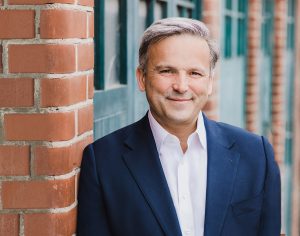Breaking America is a tough gig. Just ask Tesco, which announced it was withdrawing its chain of Fresh & Easy shops from the US market in 2013. And our biggest grocer is not the only British business to have beaten a hasty retreat: Marks & Spencer, WH Smith and Dixons all failed to realised their American dreams.
Still, these cautionary tales fail to dissuade legions of UK companies from attempting the leap across the pond. For many, America really is the land of opportunity, promising fame and fortune if they strike it lucky. For Funding Circle, the peer-to-peer lending platform, it was no different. “The question was: ‘could we live with ourselves if we hadn’t gone and tried the US?’” says James Meekings, co-founder and chief commercial officer of Funding Circle.
Business in the UK was booming – the firm has to-date facilitated loans of almost £700m to British SMEs – and Meekings and his co-founders Samir Desai and Andrew Mullinger spotted that the US market was ripe for innovation. “We saw what was happening in the US in terms of consumer marketplaces – things like Prosper and Lending Club – and we thought, ‘OK, what happens if those US marketplaces go into business lending?” explains Meekings.
“We knew in those markets there is a huge first-mover advantage, so if we hadn’t gone a year and a bit ago it would’ve been much harder to go later. We never wanted to look back and say, ‘we wish we’d done that’. Also, as the US companies that did it grew, they could come over here and eat our lunch as well. It was a form of attack as well as a form of defence.”
Just as they’d had to navigate the complex regulatory landscape in the financial services sector when setting up shop in the UK, it looked likely to be similarly onerous in the US – unless they could find an acquisition target that already had the necessary approvals. “We partnered with a US business, Endurance Lending Network, which was founded by Sam Hodges [who is now considered the fourth co-founder of Funding Circle] and they had about 12 or 13 people when we partnered with them. We had a very similar set of values and vision about what we wanted to achieve.”
In the first month of partnership at the end of 2013, $300,000 was lent through the platform. Just 18 months later, the US business is now lending $15m a month – and it’s growing all the time. Lending in the US in the first quarter of this year was seven times larger than lending in the first quarter of 2014.
Meekings is the only one of the co-founders who hasn’t spent a substantive period of time over at the US office – in San Francisco, “like all good tech companies”. Desai, the CEO, spends a week a month Stateside and Mullinger has also passed some time on the West Coast. “His [Mullinger’s] role was looking at the credit function but also making sure the cultures synched up. We spent a lot of time when we merged the businesses focused on values work. We were pleased with what we’d achieved in the UK so Andrew’s job was to take those softer things and make sure they went across as well.”
Maintaining the right culture is something fast-growth companies often struggle with as they expand. Meekings says it is key to make sure the building blocks are there from the get-go. “It came naturally from three people who were friends and then became four with the US business but we definitely need to think about it more as we grow. Loads of entrepreneurs have said to me that they’ve been impressed that we’ve kept our culture at the size we are now, with 300 people.”

Sam Hodges, James Meekings, Samir Desai & Andrew Mullinger
The fact that the business has been built on a solid friendship between Meekings, Desai, Mullinger and now Hodges too has undoubtedly helped foster an inclusive and entrepreneurial culture. The friends met at the University of Oxford where Desai and Meekings were reading economics and management. “We met Andy at the bar,” smiles Meekings.
He is full of praise for his co-founders. “Samir is a super smart guy. The relationship with him was almost like my relationship with my sister – you’ve just got to keep up with him. It was a privilege to be at university with and to meet some people who are not only super smart but are also down to earth, with complete humility.”
After leaving university in 2004, Meekings went to work for consultancy firm OC&C. “Consultancy is almost like a working MBA for new grads – you get quick exposure to everything but you work really, really hard for it,” he says.
Desai also took a consultant job at BCG while Mullinger was working in risk for financial services firms such as EY and Citigroup. The initial idea for Funding Circle came from Desai, who was exploring SME lending options as part of his day job. “One of his tasks was to find out why Northern Rock didn’t have a small business lending arm and whether it should,” explains Meekings. “In that process of researching small business lending, he started to see it was just such an inefficient market that served the customers really poorly.”
The three uni friends got together to discuss Samir’s idea of creating a company to challenge the banks and give a better service serves both to and the businesses. Funding Circle would be a peer-to-peer lending site, where businesses could borrow money from private individuals. But it took a year of meetings around the kitchen table before they decided to take the leap of faith and quit their day jobs in the summer of 2009. “To be an entrepreneur you need a certain amount of naivety. If you can mix up smartness with naivety and pure ambition, you’re going to go a hell of a long way.”
After closing a first round of funding the following autumn, it was all systems go. “We had a while in the kitchen and that wasn’t very productive so we went to serviced offices in Hanover Square and hired a room, just the three of us,” says Meekings. “From there, we expanded and hired our first people and haven’t really looked back since.”
With three founders (now four, with the addition of Hodges), was there ever a danger that they may tread on each others’ toes? Meekings says not. “We are quite lucky. When you look at founders – how many there are and what they do – it can be that people start arguing. The most important thing is trust and the fact that you like each other. There’s going to be massive arguments, so you need to like each other and be able to bury the hatchet. Because we were friends for many years before, we were able to argue and come up with better solutions. You can then wake up the next morning and be fine with it.”
It helped too that the trio had complementary skill sets. Whilst Meekings’ forte was marketing, Desai looked after strategy, finance and operations and Mullinger was the risk expert. “It just worked. Even when we wrote the business plan that’s how we split the writing and it’s just gone from there.”
That’s not to say it was all smooth sailing in those formative months. Funding Circle experienced its fair share of teething problems, explains Meekings. “The first few months of any start-up are difficult for technology reasons because you build stuff and it just doesn’t work. It’s very painful. But you have to overcome it and fix it. It’s better to launch a business with most things working and some things not working than spending all your time developing the software, making it perfect and then launching it only to realise that customers actually wanted something different.”
Another challenge was juggling the two user groups. “Because we’re a marketplace, managing borrowers and investors in the first three months was really difficult. We had periods when we had just one loan on the platform. Anyone who’s involved in marketplaces knows that the whole point is building up a portfolio and diversifying, so if you go to a platform that only has one loan, that’s really not very good. If you come to the platform today you can get hundreds of different loans.”

The reluctance of many of the banks to lend to small businesses during the downturn helped create the perfect conditions for a platform like Funding Circle to thrive. “Without the credit crunch, it would have been much harder for our founder borrowers to take the plunge with a new service like us because they’d have just gone to the banks.”
Is it true that the high-street banks are now open for business, as they proclaim? “It’s quite unclear what the situation is with the banks,” says Meekings. “You listen to business owners and they say the bank doesn’t want to lend to them you listen to the bank and they say they do want to lend to them.”
Funding Circle’s relationship with the banks appears to have evolved since 2012, the last time we met. It has partnered with Santander and RBS – a move that would have been unthinkable three years ago. “I think there’s been a growing up on both sides,” admits Meekings. “We had marketing campaigns that, like any disruptive business, were trying to grab headlines quickly. We had a campaign that said, ‘no thanks, banks’ running across the newspapers and, at the same time, banks were very dismissive about what we were trying to do.”
“Both of us didn’t really fully understand how we could work together. It’s still competitive but it’s complementary at the same time.” So is this the beginning of a new era of harmonious relationship between the banks and the peer-to-peer lender? “Yes, with some banks,” smiles Meekings.
Getting cosier with some of the high-street banks is clearly doing nothing to halt Funding Circle’s stratospheric growth. It recently completed its series E funding round, taking it to a reported $1bn valuation. Even for a company that makes borrowing easier for small firms, Meekings acknowledges that the fundraising process can take its toll. “It’s all true what people say about raising money. I can speak on behalf of the team who are more actively involved and say that it’s stressful and time-consuming.”
But they now have the benefit of experience, having done five official rounds in addition to a seed round. “It’s all about setting a calendar and making sure all the investors know the different stages and time-boxing it. Otherwise it just goes on and on. If you run a tight process and there’s competition from investors to get in, it’s much easier. It also becomes easier over time. The hardest thing we’ve probably ever done is raising our first financing round,” he says.
All the hard work has undoubtedly paid off: with its $1bn valuation making headlines, Funding Circle is a British start-up success story. But fame and fortune isn’t what gets Meekings out of bed in the morning. “Success for me is creating something that is meaningful, makes a difference and creates positive change. You hear politicians say they go into politics because they want to make a change to the way the world works but if you do that you’re only playing in the existing world,” he explains. “Entrepreneurs are the true politicians: they are actually changing the world for the better.” ![]()
Share via:








































